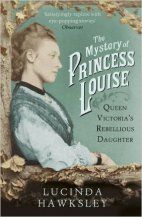The Mystery of Princess Louise: Queen Victoria's Rebellious Daughter - Lucinda Hawksley

The Mystery of Princess Louise: Queen Victoria's Rebellious Daughter - Lucinda Hawksley

Non-Fiction
Pages: 400
Before Princess Diana, there was another 'People's Princess', who won the sympathy and affection of people all across the world and is still remembered fondly in a way that few other of Queen Victoria's children are. Princess Louise is by far the most sympathetic of all Victoria's children, if only because she is the most recognisably modern. She was a bridge between the Victorian and modern world, living through the reigns of Victoria, Edward VII, George V, Edward VIII, George VI, through the upheaval of WW1 and died just after the outbreak of WW2. She was a rebel at a time when few women were, a woman who tried her best to defy her royal birth and follow her own path. She was a talented artist who mixed with the bohemian set, who had the common touch and was rarely aloof or haughty. And her life may have been even more rebellious than that...
I say 'may', because much material relating to Princess Louise's life is closed to researchers, even now half a century and more after her death, and a result, biographies such as these contain far too much speculation to be treated as fact. I would hesitate to call this book genuine history, as there is just far too much supposition and, well, guesswork. Louise may have had an illegitimate child; she may have had lovers; her husband may have been gay. But none of this is fact.
Frankly, it is hard to imagine what revelations in Louise's life could have been so shocking to the Royal Family that her records and papers are still closed. Even if all the above were true, whilst such things may have beyond the pale in the Victorian and Edwardian eras, few people today would bat an eyelid. The vast majority of the population probably don't even know Princess Louise existed, so it's scarcely plausible than any such revelations could rock the foundations of the monarchy. And keeping records of her life hidden and secret only gives rise to rumours and speculation, such as those that populate this book.
None of this, of course, is the fault of the author, who freely acknowledges being stymied by the Royal Archives and red tape. But I'm always hesitant about authors who acknowledge supposition as such when first presented and then proceed as though that supposition were fact. Lucinda Hawksley has written a good book, but the lack of actual truth or hard evidence means it falls into that awkward gap between historical truth and imaginative narrative.